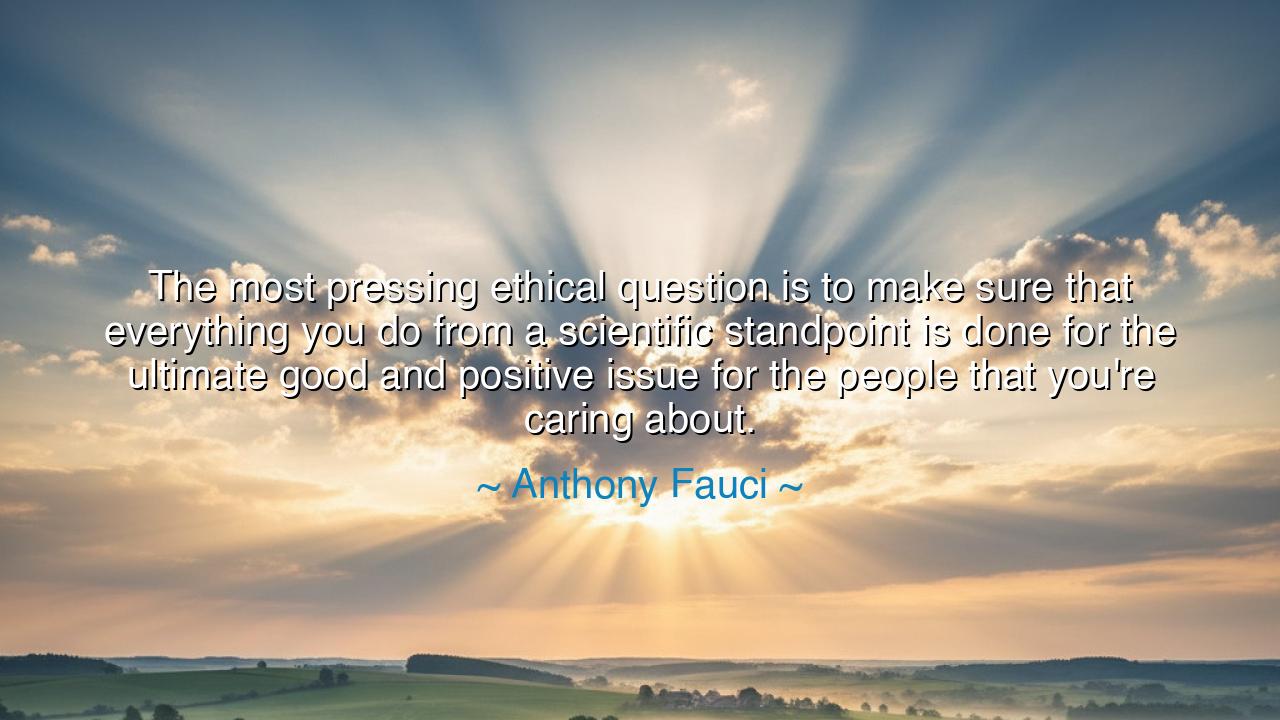
The most pressing ethical question is to make sure that
The most pressing ethical question is to make sure that everything you do from a scientific standpoint is done for the ultimate good and positive issue for the people that you're caring about.






The words of Anthony Fauci, “The most pressing ethical question is to make sure that everything you do from a scientific standpoint is done for the ultimate good and positive issue for the people that you’re caring about,” shine with the weight of conscience and the fire of responsibility. He speaks as one who has stood at the intersection of knowledge and power, where the choices of a few can shape the lives of millions. His words remind us that science is not merely discovery—it is stewardship, a sacred trust to serve humanity.
The origin of such wisdom arises from the long history of medicine and science, where progress has too often carried both healing and harm. The same knowledge that can cure can also destroy, depending on the spirit in which it is used. Fauci declares that the guiding star must always be the ethical question—not what can be done, but what should be done. For without this compass, even the brightest minds may wander into darkness.
Consider the story of Jonas Salk, who gave the world the polio vaccine. When asked who held the patent, he replied, “Well, the people, I would say. There is no patent. Could you patent the sun?” His answer reflected the very principle Fauci describes: that the ultimate good must outweigh personal gain, and that the fruit of science belongs first to the people. Salk’s sacrifice stands as a living example of how knowledge, guided by ethics, can change the course of history.
Fauci’s words also carry a warning for all who wield knowledge. To act without care for the people is to betray both the spirit of science and the essence of humanity. Experiments done for greed, policies shaped for pride, or discoveries hoarded for profit—all these are violations of the sacred bond between those who know and those who depend upon that knowledge. True greatness lies not in the discovery itself, but in the positive impact it brings to those in need.
The lesson here is both noble and eternal: wisdom without compassion is empty. The scientific mind must also be the ethical heart, weighing each action by the measure of its benefit to humanity. To pursue truth while neglecting love is to lose both. To unite them is to forge a path that uplifts the world.
Let the generations remember: the most powerful question is not “Can we?” but “Should we?” And the answer must always be guided by the good of the people. For in this lies the true purpose of knowledge—not to glorify the few, but to heal, protect, and uplift the many. Only then does science fulfill its highest calling.






NTNguyen Thuy
Anthony Fauci’s perspective on ethics in science highlights the complexity of balancing progress with moral responsibility. But it makes me wonder, how do we assess the potential harms versus benefits of scientific advancements in real-time? As we push for innovation, can we be certain that we’re always prioritizing the right outcomes for the right people, and how do we ensure that no one is left behind in the process?
LDnhat linh do
I appreciate Fauci’s emphasis on the ethical responsibility in science. It’s crucial to remember that scientific advancements should ultimately improve lives. However, there’s often a conflict between rapid innovation and ethical implications. How can we as a society keep pace with the speed of scientific breakthroughs while ensuring that ethical considerations, such as equity and justice, are not compromised in the rush for progress?
AHANH Huynh
Fauci’s ethical consideration in science is vital, but it also brings up the question of who defines the 'positive issue' for people. Can one person or group truly determine what’s best for everyone? With diverse populations and varying needs, how do we ensure that scientific advancements benefit all groups equally? Should there be more inclusive dialogue in the scientific community about what constitutes the ultimate good?
YNYen Nguyen
I completely agree with Fauci’s sentiment that science should always aim to serve the greater good. However, I wonder if this is easier said than done. Science, particularly in fields like medicine and technology, can have unintended consequences. How do we anticipate and mitigate these risks? And how do we ensure that decisions are made transparently and with accountability, particularly when the stakes are so high for public health?
HYHong Yen
Fauci’s quote raises an important point about the moral implications of scientific research. While the pursuit of knowledge is crucial, it should always be guided by the well-being of people. But how do we define the 'ultimate good'? Does it vary depending on cultural or social contexts? How do we balance scientific progress with ethical considerations, especially when the results may affect vulnerable populations in different ways?